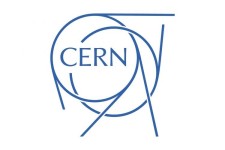CERN

The European Organization for Nuclear Research, known as CERN (Conseil européen pour la recherche nucléaire), is an intergovernmental organization that operates the largest particle physics laboratory in the world.
Established in 1954, it is based in a northwestern suburb of Geneva, on the France–Switzerland border. It comprises 23 member states, and Israel (admitted in 2013) is currently the only non-European country holding full membership. CERN is an official United Nations General Assembly observer.
The acronym CERN is also used to refer to the laboratory; in 2019, it had 2,660 scientific, technical, and administrative staff members, and hosted about 12,400 users from institutions in more than 70 countries. In 2016, CERN generated 49 petabytes of data.
CERN's main function is to provide the particle accelerators and other infrastructure needed for high-energy physics research — consequently, numerous experiments have been constructed at CERN through international collaborations. CERN is the site of the Large Hadron Collider (LHC), the world's largest and highest-energy particle collider. The main site at Meyrin hosts a large computing facility, which is primarily used to store and analyze data from experiments, as well as simulate events. As researchers require remote access to these facilities, the lab has historically been a major wide area network hub. CERN is also the birthplace of the World Wide Web.
CERN is home to some of the world’s most complex scientific instruments, used by physicists to probe the fundamental structure of the Universe. The technologies developed to operate these instruments – and, in general, to pursue CERN’s fundamental mission – have applications in areas beyond particle physics. CERN’s Knowledge Transfer (KT) group works proactively to maximize the dissemination of these technologies and the impact of CERN in society, by actively scouting for opportunities to accelerate innovation and work with leading industries in the domains of Healthcare, Environment, Digital, Quantum technologies and Aerospace.
- Public sector
- Other health field concerned
- Research
- Local and international

